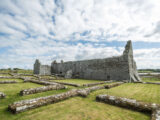Notice
Rathfran Abbey is a state-owned National Monument in the care of the Office of Public Works
WARNING: It should be noted that these sites are unguided and a level of care and caution should be maintained during all stages of your visit. The Office Of Public Works (OPW) will not be held responsible for any damages, injuries, or losses that occur
Rathfran Dominican Friary
Founded in 1274 for the Dominican Friars, and dedicated to the Holy Cross, the founder of Rathfran Abbey is still uncertain. Historians have claimed the Abbey was founded by either Sir Richard D’Exeter or Sir William de Burgh, but which one is still unknown.
Rathfran Abbey overlooks the Palmerstown River, which made for a strategic placement for transport and trade. Now a roofless structure, Rathfran contains remnants of its former glory: a crucifixion panel over the west door, remains of a triple lancet window, and the foundations of the two cloisters that once existed at the north of the church.
The Abbey carries with it a dark history, as it was here that Edmond MacWilliam de Burgo was killed in 1513 by his nephews; and in 1590, the Abbey was burned by the army of Sir Richard Bingham, Governor of Connaught.
There is a story, whether true or not is unclear, attached to Rathfran Abbey about treasure hidden somewhere within the grounds. According to the tale, Colonel Knox of Castlerea went to survey the wreckage of a British cruiser that washed up at the coast of Belderrig; on it was a large sum of gold.
Finding survivors, Knox insisted that they pull the lifeboat, with the box of gold, along the coast to his home in Castlerea.
When night fell, making it much harder to navigate, they had landed near Rathfran Abbey on Palmerstown River. Rather than continue in the water, the survivors followed Knox the rest of the way on foot for shelter and food. To do this though, the lifeboat, with the gold, had to be left behind. Knox left it in the charge of 4 men. However, as the night worsened and rain descended, the men left for home, burying the gold on the site for safe-keeping.
When Knox returned the next morning the gold was nowhere to be found.
Years later, when the last of the 4 men was on his death-bed, he revealed to his family where the gold was hidden – “fourteen ridges from one corner of the Abbey”.
But the Abbey is made up of more than one corner…
To this day that box of gold has never been found.
Protect our Past - Click here to read about the importance of protecting our country’s unique heritage sites
This national monument is protected in accordance with the National Monuments Acts 1930 to 2014
Gallery
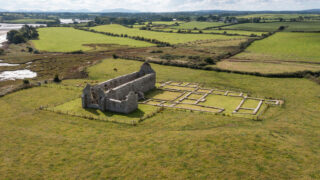
Aerial view of Rathfran Abbey Credit National Monuments Service, Photographic Archive, Government of Ireland 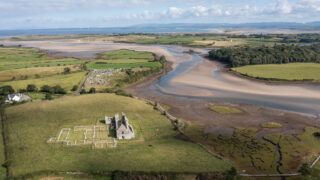
The stunning landscape at Rathfran Credit National Monuments Service, Photographic Archive, Government of Ireland 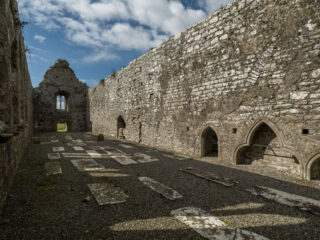
Internal ruins and gravestones of Rathfran Credit National Monuments Service, Photographic Archive, Government of Ireland 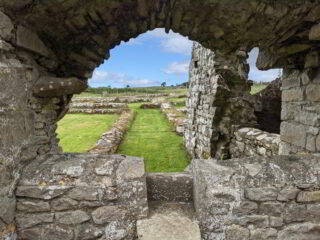
A look out through history Credit Charlotte Salter Townshend
Nearby sites to visit
Céide Fields Neolithic Site and Visitor Centre
The world’s most extensive Stone Age monument
Approx. 15.8 km from Rathfran Dominican Friary
Carrowmore Megalithic Cemetery
Ireland’s oldest megalithic tombs set in a dramatic neolithic landscape
Approx. 47.1 km from Rathfran Dominican Friary
Sligo Abbey
Where friars’ prayers echo among the ruins
Approx. 50.4 km from Rathfran Dominican Friary
Parke’s Castle
Walk in the footsteps of planters and Gaels
Approx. 59.2 km from Rathfran Dominican Friary
Boyle Cistercian Abbey
Step back into Ireland’s monastic past
Approx. 68.4 km from Rathfran Dominican Friary
Seán Mac Diarmada Cottage
One of the cradles of the Rising
Approx. 80.5 km from Rathfran Dominican Friary
